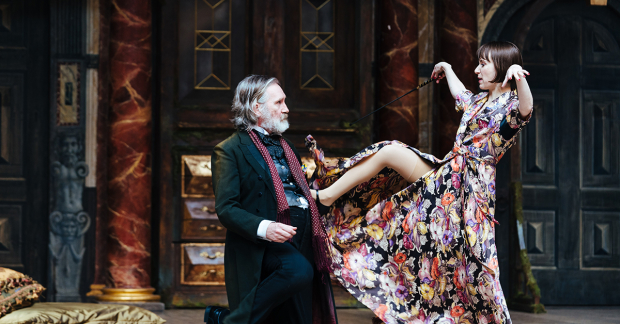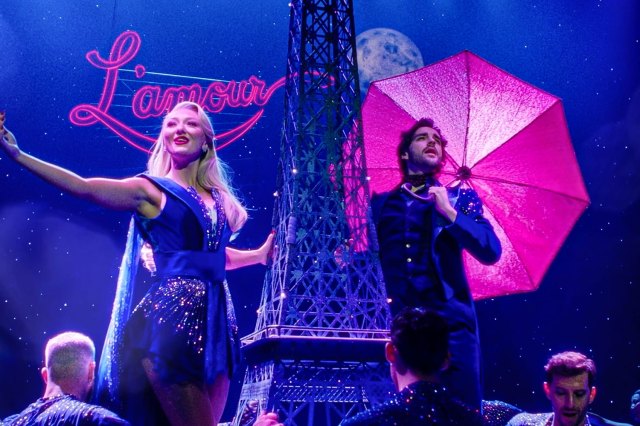Review: The Merry Wives of Windsor (Shakespeare's Globe)
Pearce Quigley stars as Falstaff in the latest opening at Shakespeare’s Globe

© Helen Murray 2019
It's pretty de rigueur these days for modern directors to mess about with the historical settings of Shakespeare plays, and purists are particularly unprotective of this likeable but meandering comedy. Allegedly written in the 1500s at the request of Elizabeth I, who was particularly enamoured of the corpulent, hell raising knight Falstaff from the Henry IV plays, it's far from the best of the bard. Done badly, and an almost complete absence of gravitas or poetry plus the overly intricate plot centring on Falstaff's attempts to ameliorate his financial lot by courting the wealthy Merry Wives of the title, can make for a very tedious evening.
That's not the case here: director Elle While puts a slapstick, mime/dance heavy 1930s spin on it that works for the most part – at times it feels as though Shakespeare has created an Aldwych farce – but suffers from an inconsistency of tone which sometimes detracts from the show's strengths. It also adds more ad libs to a Shakespearean text than I've ever come across before: "I'm still here you know" mutters a baleful Sir John Falstaff as a bunch of authority figures gleefully discuss his humiliation near close of play.
Pearce Quigley cuts a wonderfully rumpled, Eeyore-ish figure as Falstaff. This sad-eyed, sarcastic, northern-accented outsider is quite different from the debauched rabble rouser we may be used to, but it is an inspired take on the role. Whether casually emptying a shoe full of Thames water over a couple of groundlings, or crouched down in semi-pain being suggestively whipped by Bryony Hannah's sparky Mistress Ford, this Falstaff is frequently hilarious but has a persistent whiff of despair about him that means he is as touching as he is amusing. It's a memorable performance, and one that relishes and acknowledges the proximity of the audience, without pandering to it.
Most of the rest of the acting lacks finesse, perhaps inevitable given the wide open spaces of the Globe auditorium and the breakneck pace of the staging, but the absence of a cohesive style becomes more frustrating as the evening wears on. Sarah Finigan and Forbes Masson as the Pages – she pertly upwardly mobile, he raging and red-faced – are naturalistic creations and palpably in the same universe as Quigley's superb Falstaff. Richard Katz's campy, Anglais-mangling French physician starts out as very funny but he is so far over-the-top that he has nowhere to go and you end up feeling as though you're watching somebody from an Elizabethan edition of '''Allo 'Allo''.
Similarly, Anne Odeke's Hostess and Hedydd Dylan as a manic Welsh parson are played exclusively for laughs (which, to be fair, they mostly get) while Jude Owusu achieves moments of authentic pain and rage as would-be cuckold Frank Ford. Boadicea Ricketts' strikingly forceful Anne Page seems jarringly modern and Zach Wyatt and Joshua Lacey deliver fleet-footed, graceful work as a pair of suitors that appear to have wandered in from a vintage musical. Most of it is enjoyable, but it becomes bewildering, like trying to watch several different productions all jockeying for position on the same stage.
The 1930s design style doesn't sit naturally on the Globe's beautiful stage and the show lacks any real visual interest until the final Windsor Forest scene with the company decked out as gorgeous, Pierrot-like figures to entrap Falstaff. Frank Moon's musical sequences are terrific, and dynamically choreographed by Sasha Milavic Davies.
As the run goes on, the disparate elements may yet coalesce into a more satisfying whole. There is a built in problem with the play itself, in that it is never as flat-out funny as, say, The Comedy Of Errors, as intriguing as A Midsummer Night's Dream or As You Like It, or as heartwarming as Twelfth Night. But there is certainly a lot here to like and, judging by the vocal reactions of some of the crowd last night, While's staging has the makings of a popular hit. Quigley's Falstaff would be worth the price of a ticket by himself.



















